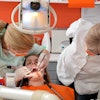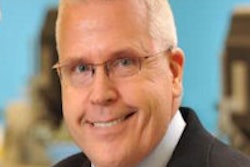
NEW YORK - Fred Ferguson, DDS, offered a frank assessment of the U.S. healthcare system during his session at the Greater New York Dental Meeting on Tuesday: Cost outweighs health. And it has led to a dentistry approach that is deeply flawed.
"Our culture of 'reactive' healthcare cannot address behaviors, lifestyles, and habits that are driving common chronic health problems and related claims and costs," Dr. Ferguson explained. "The hardest thing we do as dentists -- what is it? Changing behavior -- not the dentistry."
During the half-day seminar, he offered practice-level solutions that can be adopted by pediatric dentists and urged collaboration with other healthcare providers.
Dr. Ferguson, a diplomate of the American Board of Pediatric Dentistry and a professor and the director of the advanced education program in pediatric dentistry at the Stony Brook University School of Dental Medicine, started with a story about a young patient with teeth that were badly cavitated. His mother would not let Dr. Ferguson extract them, and treatment options were significantly limited by her income.
He utilized a treatment plan that focused on behavior change, and the boy was able to keep his primary teeth. "The dentistry didn't save this kid. The parenting did," Dr. Ferguson explained. "The parenting was the problem. [The mother] got no instruction from her previous dentist, just advice to brush better."
The overall lack of oral health guidance that new parents receive is a major factor in dental caries, "the most prevalent contagious illness in childhood," as Dr. Ferguson put it.
He polled the mothers in the audience: "In your new mommy package, was there anything about taking care of your kid's teeth?" Only one person said "yes" -- a woman from Toronto.
Some problems are built into the system. For example, the Healthcare Effectiveness Data and Information Set recommends an annual dental visit between the ages of 2 and 21. "I would love to know who sat on these boards and decided that age 2 was a good place to start," Dr. Ferguson said. In dentistry, "most agree that regular dental care should begin by 1 year of age, with a checkup at least twice each consecutive year for most children."
"Even with insurance, many children do not have a pediatric dental provider," he noted.
But how do parents find dentists, particularly when they're often not instructed to bring their children in to a dental home until the child is 2 or needs documentation of a dental visit for their child to begin school?
"I get really interesting answers when I ask, 'How did you find me?' " Dr. Ferguson said. The question led to an amusing moment when an audience member pointed out that Dr. Ferguson's picture can be seen on advertisements on New York trains.
Point taken, Dr. Ferguson moved on, recommending that dentists, especially those with children of their own, ask pediatricians about when they recommend the first dental visit. "Give them your card when they stutter out their answer or aren't able to respond with one at all," he said. "That's a business opportunity."
Pediatricians generally won't do caries risk assessments because they're busy. "But if a pediatrician says, 'Go to a dentist,' it works," Dr. Ferguson continued. "Therefore, you should be giving pediatricians a card, and maybe an information one-sheet to hand out. Take the pressure off of them! They'd love it."
The recommendation works for other doctors in the community. "Half of us adults over the age of 30 have periodontal disease. The Centers for Disease Control and Prevention found that previous data severely underestimated the prevalence of periodontal disease," Dr. Ferguson explained. "In your communities, reach out to your medical brethren who have no idea what they don't know. You have an opportunity to educate and affect your bottom line."
He often returned to the theme of patient education and stressed its importance. The youngster with a mouthful of decay he referenced at the beginning of his talk was his primary example of how to do it effectively. "We scheduled a one-month recall. Why? Because mom was the real patient," Dr. Ferguson said. "And she had to pay out of pocket because she is my patient. I'm her coach, trainer, lifestyle guide. Then I brought her back after three months. Then six. And then one year.
"The kid," Dr. Ferguson explained, "is the symptom."


















